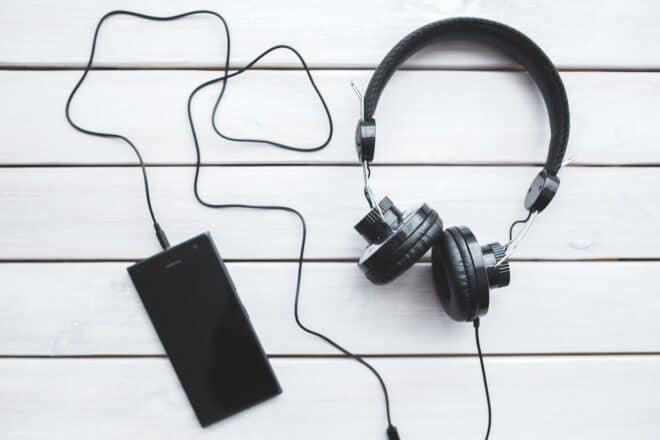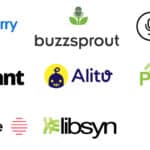Undiscovering Pods: Why Do We Stop Listening To Podcasts?

We here at Discover Pods Dot Com are in the business of helping the general public discover podcasts, but what happens when you stop listening to a podcast?
I listened to an audio drama for years that I suddenly lost interest in. I don’t feel comfortable naming the show since, while there were aspects of it that definitely don’t hold up in hindsight, I can’t really say I stopped listening to it for any solid reason.
I remember constantly checking the run time while listening to it. I felt myself waiting for it to be over, feeling obligated to listen to it before I could move on to something else. I didn’t want to spend time with the show anymore.
It didn’t have anything to do with the episode length. There are some shows that I listen to that drop >4 hour episodes that I cannot wait to dive into. Unnamed Audio Drama’s 24-minute runtime is actually pretty reasonable for the medium. It got me thinking about the reasons people stop listening to podcasts.
There are plenty of valid reasons to stop listening to a podcast. Maybe the audio quality drops to a point where the content of the show can’t save it. Maybe you aren’t in the right headspace to listen to the topic of conversation or themes of the story. Maybe a podcast mini-series about systemic racism and workplace toxicity in a popular media company turns out to have been made by a popular media company rife with systemic racism and workplace toxicity. These things happen.
There have been a lot of discussions surrounding podcasting as a disposable media before, but mostly from a creator standpoint. The term “podfading” refers to when a podcast slowly stops producing new episodes without any warning. This is usually connected to not getting what you want out of a project.
What are we as listeners trying to get out of a podcast? If a podcast isn’t giving you what you want out of it, then it is perfectly reasonable to stop listening.
I asked around to see what reasons people had for dropping shows. For podcast creators, this might not be a go-to list for reasons people stop listening to your show. This is more about a general blanket listener experience. You can look at this list for pointers, but if you find yourself dealing with a drop in listeners, it might help if you reach out to your listeners to see what it is about your show that keeps people coming back.
FOMO
There are so many good podcasts out there, that sometimes you want to make sure you are making the most of your listening time. Even if something is free, you’re still paying with your time. Even if a podcast is good, you might be thinking about the next episode in your feed. That good podcast becomes an obligation to get through to listen to the new episode.
Ease of Dropping Free Media
It can feel easy to drop a podcast since it is free to listen to. This is admittedly a frustrating thing for podcast creators to hear, but you don’t have the sunk cost fallacy working on your side to retain listenership. It’s one of the universal struggles about free online content. On the flip side, if you are listening to content that might be behind a paywall such as Patreon, you might feel like you have more of an obligation to listen to the show.
Accessibility issues
The harder it is to listen to a podcast, the easier it is for you to justify dropping it. Sometimes it could be as simple as being exclusive to a player you don’t use. I’ve run into this a lot with Spotify exclusives. Some of us put in a herculean amount of effort to listen to The Besties when it came back in 2020 as a Spotify exclusive (the epic struggle of remembering to go to Spotify and listen to it at some point).
That’s just an example of a podcast making you take an extra step. However, there are issues that can genuinely make podcasts inaccessible to a point where continuing to listen becomes impossible for a portion of the audience. Transcripts are becoming (or, if we’re being honest, have always needed to be) a necessary part of the podcasting experience, as fellow Discover Pod writer Cassie Josephs outlined in this article from 2020 (along with advice on how best to implement transcripts to your show). If a podcast doesn’t provide transcripts for their episodes, they’re turning away every potential listener that prefers or needs them.
I would also consider unlabeled triggers an accessibility issue. If a show delves into heavy themes without warning their listeners, that can be genuinely dangerous to the audience.
The Reverse Sunk Cost
In case you’re not sure what this is, a sunk cost is an investment you’ve already made that you can’t get back. Often it is used as a motivation to continue doing something, as you have already put time/money/whatever into it.
If this is true, then it also means the opposite can be true. If you’ve spent time or money on something in the past and have not returned to it for some time, then you might as well cut it out of your routine officially. I’m going to refer to this as a reverse sunk cost.*
In the summer of 2019, I went on a week-long cross-country roadtrip from New York to Florida and back with my best friends. We went to beaches and Disney World and had a wonderful time talking and listening to music for the 50+ hours in the car.
I have not been up to date on my podcasts since. Yes, I know, my suffering is too terrible to bear. I thank you all for your thoughts and prayers as I went through that trying time two years ago.
A lot of people aren’t fully up to date on every show they listen to, but it can be more intimidating when “a few weeks behind” becomes “a few months behind.” You’ve put off listening to it for so long that you decide to stop listening to the show altogether.
*I found out that a “reverse sunk cost” means something completely different then what I’m talking about, but I prefer my way of thinking of it. I’m not an accountant, I’m an artist!
Lifestyle Changes
Let’s say hypothetically you start to commute less, or find yourself doing a different kind of work that requires more attention, or other major routine adjustments that might have been sprung from a major global crisis. The podcasts you listen to might become a more active choice as opposed to background noise to your daily routine. If you’re in a place where you can’t listen to as many podcasts as you used to, you might decide to streamline your library to the shows that you really want to spend your now limited time with.
People Showing Their Whole Asses On The World Wide Web
There might be a podcast that you enjoyed listening to, but dropped since you couldn’t in good conscious support the people behind it. Consuming content is a form of support, no matter how free it might seem. This is one of the more purposeful reasons on this list, since this isn’t really something you usually realize mid-episode depending on the show. I’m not going to list the reasons why you might come to this conclusion, partially because the internet continues to surprise me in the ways people can be messed up and also because something that might be a misstep for you could be a dealbreaker for someone else.
Burning Out On A Genre
Even if you are a fan of a genre, such as fiction podcasts or news podcasts or chat shows, you may eventually find yourself becoming worn out from listening to so many of the same kind of show. This could be as specific as wanting to cut down on the horror shows you listen to, or as broad as scripted shows altogether. Sometimes the worst thing a podcast can be at a certain moment is exactly what it is. For example, I unsubscribed to some of the Headgum shows I was a fan of after getting worn out by their usually entertaining house style of comedically hollow overconfidence.
I think all of these examples bring listeners to a very specific moment where they reevaluate how important it is for them to continue listening to a show. They think “am I alright just skipping this one episode?” and after they might think, “do I still care enough to listen to this show?” That’s that most scare tactics PSA way of describing this, but that’s a healthy way to approach any form of media. For listeners, it means that you keep yourself entertained with content that you like. For creators, it means that your listeners are genuinely invested.













Comments
Comments are closed.